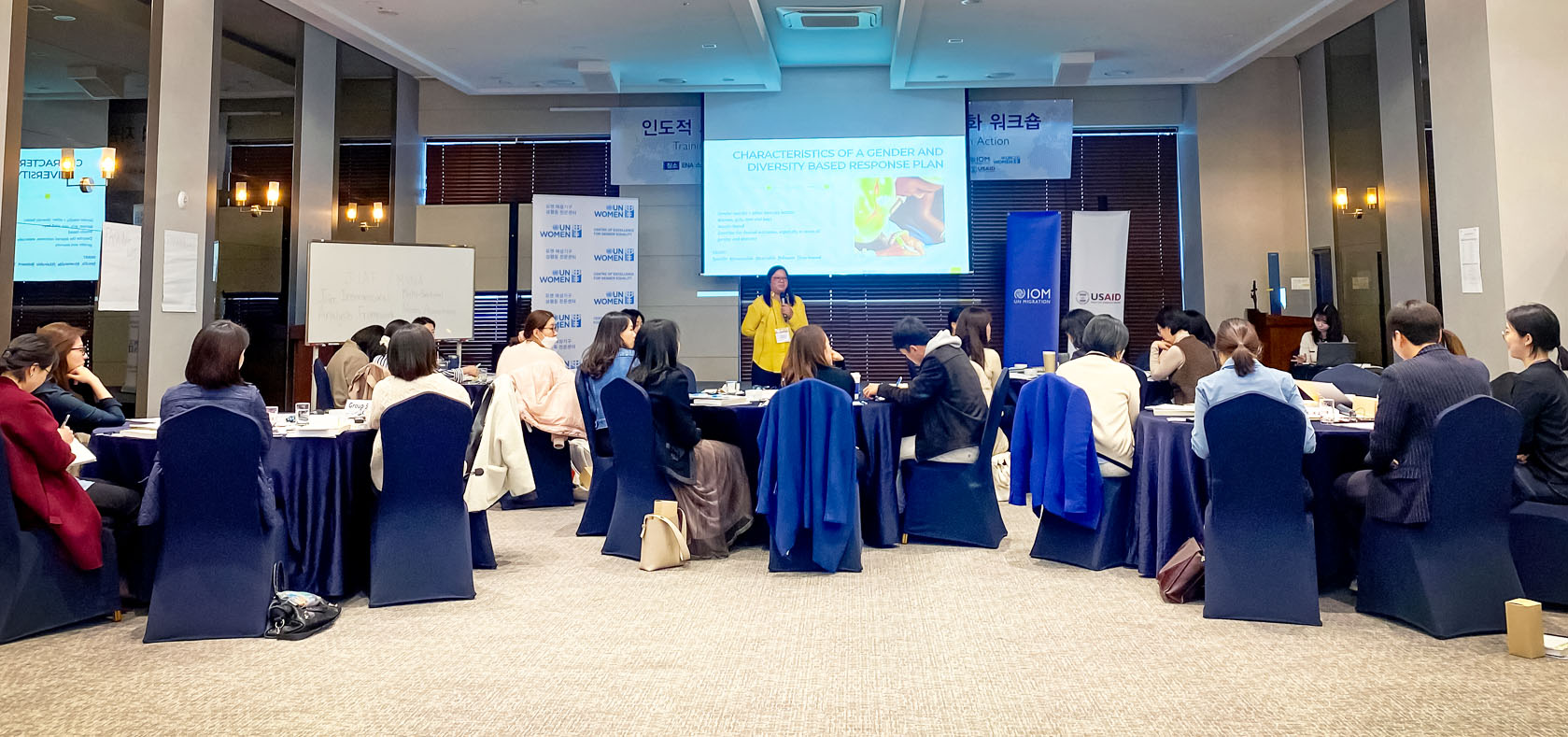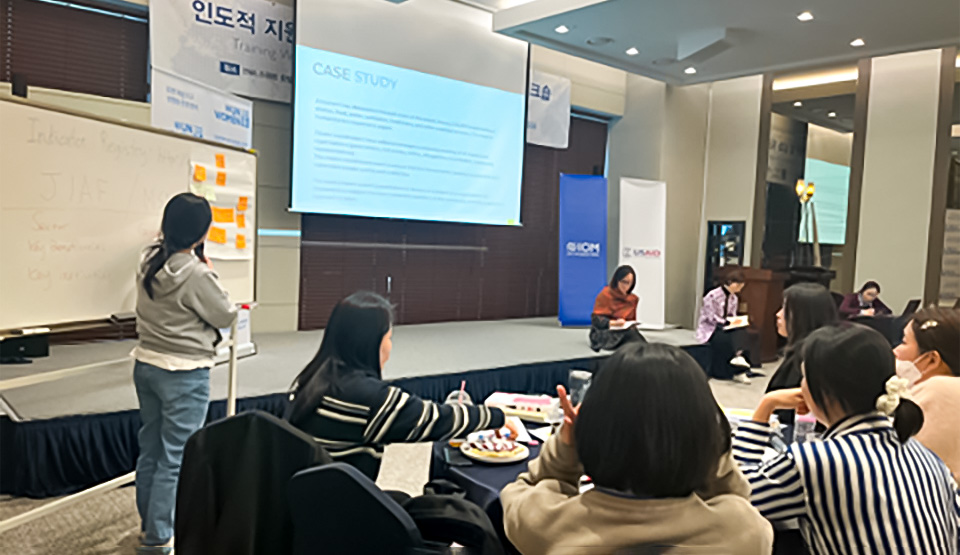Workshop on gender mainstreaming draws more than 40 humanitarian professionals
Date:

Seoul, Republic of Korea — More than 40 practitioners from across the humanitarian field attended a workshop on how to mainstream gender in the sector, held at the end of March in Seoul. The training underlined the importance of committing to gender equality at every stage of emergency operations.
The Training Workshop on Mainstreaming Gender in Humanitarian Action was hosted by the UN Women Centre of Excellence for Gender Equality (the Centre) jointly with the International Organization for Migration (IOM) and with support from the Bureau of Humanitarian Assistance (BHA) of the United States Agency for International Development (USAID).
Held from 28 to 31 March 2023, it brought together a total of 42 representatives from non-governmental organizations, civil society organizations, government institutions, and other relevant organizations with backgrounds in humanitarian action based in the Republic of Korea (ROK).
Led by the three experts from UN Women Regional Office for Asia and the Pacific, the workshop consisted of two parts: a two-day basic training, which introduced core concepts and gender mainstreaming throughout the humanitarian programme cycle, and a back-to-back advanced training for another two days with more practical exercises to design gender-sensitive humanitarian support.
The training was part of efforts of the UN Women Centre of Excellence to strengthen the capacity of the national humanitarian community to advance a more comprehensive understanding of gender aspects of humanitarian programming, specifically on gender equality and the empowerment of women and girls.
Rowena Dacsig, a programme specialist from the UN Women Myanmar country office, shared her field experience in that country. Rowena explained the concept of negative coping mechanisms noting how in some extreme circumstances without any access to humanitarian assistance, women and girls are resorting to sex work while men and boys are joining armed groups for financial assistance and for their survival.
The participants also engaged in several breakout exercises in work groups of four to five people, including an analysis of case studies and a simulation exercise on how to carry out a gender-integrated humanitarian response in sectors of WASH (water, sanitation, and hygiene), protection, education, nutrition, and food security and livelihood, resulting in the development of an action plan on gender and humanitarian action.

The ‘Power Walk’ activity, for instance, involved participants taking diverse roles of internally displaced persons, such as an elderly woman with young children to look after, a man in his 40s who is a community leader, in the context of Cox’s Bazar district in Bangladesh, home to the largest Rohingya refugee camp in the world. The activity was designed to acknowledge how intersectional identities, such as gender identity, age, and disability status, must be taken into account when working on humanitarian projects and tailoring interventions.
The participants also exchanged their own experiences and expertise from their daily humanitarian practice. After the training, the participants committed to sharing what they learned from the training with their organization and expressed their interest in continuing the conversation with UN Women and IOM on gender and humanitarian action for future work.
유엔여성기구, 인도적 지원에서의 젠더 주류화 기본 및 심화 워크숍 개최
날짜: 2023.05.16

대한민국 서울 — 유엔여성기구 성평등센터(센터)는 미국 국제개발처(USAID)의 인도적 지원국(BHA)의 지원을 받아 국제이주기구 한국대표부와 공동으로 지난 3월 28일부터 4일간 서울에서 '인도적 지원에서의 젠더 주류화 기본 및 심화 워크숍(워크숍)’을 개최했다.
이번 워크숍엔 한국에 기반을 둔 비정부기구, 시민사회단체, 정부기관 및 기타 관련 단체 대표와 실무진 총 42명이 참석했다. 참가자들은 긴급 작전의 모든 단계에서 성평등 관점을 도입하는 방법을 배웠다.
유엔여성기구 아시아 태평양 지역사무소의 3명의 전문가가 강사로 참여한 이번 워크숍은 첫 이틀 동안 인도주의적 프로그램 사이클 전반에 걸친 핵심 개념과 젠더 주류화를 소개하는 기본교육이, 나머지 이틀 동안은 성인지적 관점에서의 인도주의적 프로그램을 설계하는 체험 활동을 결합한 심화교육이 진행됐다.
이번 워크숍은 인도주의 프로그램의 젠더적 요소, 특히 성평등과 여성과 소녀의 역량 강화에 대한 보다 포괄적인 이해를 진전시키기 위한 국가 인도주의 공동체의 역량을 강화하기 위한 유엔여성기구 성평등센터의 노력의 일환이었다.
로웨나 다시그(Rowena Dacsig) 유엔여성기구 미얀마 사무소의 프로그램 스페셜리스트는 현장 경험을 공유했다. 로웨나 스페셜리스트는 인도주의적 지원에 접근할 수 없는 몇몇 극단적인 상황에서 여성과 소녀들이 성노동에 의존하는 반면 남성과 소년들은 경제적 지원과 생존을 위해 무장단체에 가입하고 있다는 점에 주목하며 부정적 대처 매커니즘(negative coping mechanism) 개념을 설명했다.
참가자들은 또한 4~5명으로 나뉜 소그룹 활동에 참여해 개인위생(WASH), 보호(Protection), 교육(Education), 영양(Nutrition), 식량안보 및 생계(Food Security and Livelihood) 분야에서 젠더 통합적 인도주의적 대응을 수행하는 방법에 대한 사례 연구 및 시뮬레이션 연습을 진행했고, 인도주의적 행동 계획을 개발하는 방법을 배웠다.

예컨대 역할활동인 '파워워크(Power Walk)' 활동을 통해 참가자들은 자국내 실향민들의 입장을 이해하는 활동을 진행했다. 참가자들은 세계 최대 규모의 로힝야 난민 캠프가 있는 방글라데시 콕스 바자르 지역의 맥락에서 어린 아이들을 돌보는 노인 여성, 커뮤니티 리더인40대 남성과 같은 다양한 역할을 담당했다. 이 활동은 인도주의적 프로젝트를 수행할 때 성별, 연령, 장애 여부 등 개인의 교차적 정체성을 이해하고 맞춤형 지원을 제공하기 위해 어떤 요소를 고려해야 하는지 알아보고자 진행됐다.
참가자들은 또한 그들의 일상에서 행한 인도주의적 실천으로부터 터득한 경험과 전문지식을 교환하였다. 워크숍이 끝난 후 참가자들은 교육을 통해 배운 것을 소속기관 및 단체와 공유하기로 약속하고 향후 젠더 및 인도적 행동에 대한 업무를 수행하는데 있어서 유엔여성기구 및 국제이주기구와 지속적인 대화를 이어 나가는 데 관심을 보였다.